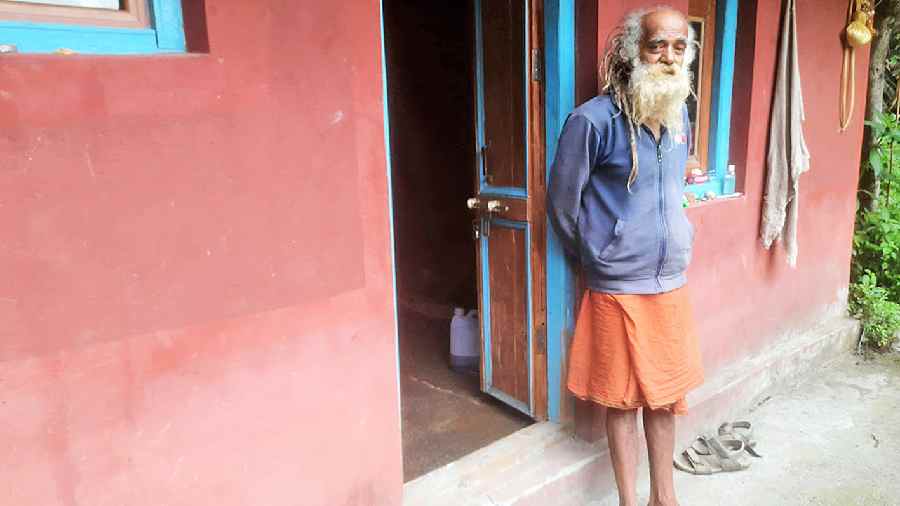The dilapidated shelf contained about two dozen books. All kinds, from something on development economics to the Gita. After a two-kilometre trek from Kalpeswar temple in Chamoli district of Uttarakhand, when we — guide Amit Mehra and I — reached the mud hut atop a hill, we found Raman Giri reading Carl Sagan.
I was in Uttarakhand for a summer break. It was Mehra, the hotel boy, who told me about Giri. The people of Urgam village, where the hotel is located, hold him in high regard. According to them, he is a wondrous combination of a “pahuche huye mahatma” and someone who can also speak English fluently.
By the time I reached the hilltop, I was gasping. “The journey up felt like penance,” I told the smiling, bearded 60-something man. He turned away with a “Let me make you some tea.”
Then, as I recovered my breath, sipping on some sweet milky tea, he told me his story.
Giri was born in Gorakhpur in Uttar Pradesh, shifted to Mumbai during his school years, eventually went to IIT Kanpur to study mechanical engineering, left it midway. In Badrinath, he met the man who became his guru, moved to the Himalayas and became a sanyasi.
As he tells it, he kept coming to the mountains and eventually turned to spirituality. But can’t one live the regular life and still remain spiritual? “Not in my case,” said Giri. “I didn’t feel like it. I wanted to simplify my life.”
Simplicity is one thing, making a home in the wilderness quite another. This has been Giri’s home for the past 20 years. He nodded, it hasn’t been easy but now he has settled into it. He had tried to live with other sadhus in akhadas in Rishikesh. “But that life was not for me,” he added.
Giri has never come across any siddha mahatma in the Himalayas, though this is widely believed to be their preferred abode. He doesn’t believe that sadhus belong to a higher plane or possess out-of-the-world abilities. He said, “I was told in the beginning that one should not occupy the mind with riddhis or supernatural powers because these are goals which again lead one away from simplicity.”
His daily routine is simple — early to bed and early to rise, lots of reading, doing the essential household chores and a little bit of sadhana.
An old transistor set — if it manages to pick up a signal — brings into his hut news from all over the world. Giri hastened to add, “I’m not interested in politics…”
Why? Is he upset with all that is happening in the name of religion? Master navigator that he seemed to be, he steered the conversation towards his non-controversial self. “I’m not religious. I am spiritual.”
But on the rack on the southern wall of his hut, there are some miniature deities including a Durga idol. He followed my glance and before I could form a question, said, “Yes, those are part of my sadhana.” His tone is definitive as if to say — I won’t say more.
I let my gaze sweep the room we are in. The floor covered with blankets. On one side, beside two trunks, his bedding. Then there was the bookshelf. On the floor, a torch, some batteries, scattered cigarette packets, broken cups with ash and cigarette stubs, a chessboard, sheets of paper, pens, paper cups, a kamandalu (water pot, usually with a handle and a spout), matchboxes, cold cream and some carry bags. In one corner of the room was a guitar.
I asked him if he played it. His reply: “No, not at all. Somebody was going further up and couldn’t carry it anymore. So, he left it here.”
Times flowed unhurriedly. I felt the jungle’s silence and listened to the gushing sound made by River Hirnavati, which flowed through a nearby gorge. “You know,” Giri said, “once the river reaches the Kalpeswar temple, it becomes the Kalp Ganga.”
Night time on the hilltop is altogether a different scenario. It’s a bushy area punctuated by tall pine trees. The hut is on a slope. “I don’t go out of my hut at night,” said Giri. He had come across leopards and bears and kept chocolate bombs ready to drive away the monkeys.
Doesn’t it get completely dark at night, I asked.
He replied, “Nah, I’ve got two solar panels installed on my window. They are very small, but then again, my needs are also small. One bulb is enough to light up my hut.” He smiled.
Can one spend a lifetime doing just these things? “Why not? I prefer living my life this way — amidst nature,” he replied.
And what did he do about money? “Well, I have a ration card, which makes the bare necessities affordable for me,” said Giri. “My greatest expenditure is smoking. And let me tell you about the one siddhi (superhuman power) I’ve mastered. It’s the art of giving up. I’ve given up smoking several times…”










